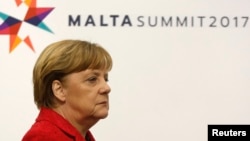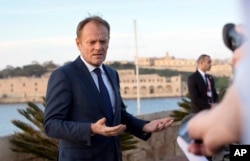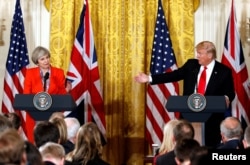European Union leaders have expressed concern about some of the policies of U.S. President Donald Trump, but said at a summit in Malta that engaging with the United States is still a high priority.
Malta's Prime Minister Joseph Muscat, who hosted the EU summit of 28 countries, said, "Obviously, there was concern amongst the EU 28 on some decisions that are been taken by the new U.S. administration, and also some attitudes that are being adopted by said administration."
However, "there was no sense of anti-Americanism," he added. "There was a sense that we need to engage with the United States just the same, but we need to show where we need to do that, that we cannot stay silent where there are principles involved."
European Council chief Donald Tusk said the EU still views its transatlantic relationship with the United States as having top priority.
"I have no doubt that for all of us this is still the highest political priority, to protect our relationship with the United States against its enemies," Tusk told reporters at the summit.
His comments came several days after he labeled the United States one of the "threats" facing the European Union, along with Russia and China.
French President Francois Hollande called for European unity ahead of relations with the United States.
"Many countries have to realize that their future is first in the European Union, rather than who knows what bilateral relation with the United States,'' Hollande said upon arrival at the summit.
German Chancellor Angela Merkel said, "The more strongly we are clear about how we define our role in the world, the better we can tend our transatlantic relations.''
Following the summit, British Prime Minister Theresa May defended her recent meeting with Trump despite concerns among EU leaders about his policies toward Europe. She said that while Britain wants a strong relationship with the United States, it also wants to see a strong Europe.
Brexit and immigration
The concerns about Trump overshadowed other discussions at the summit, including on the topics of Brexit and immigration.
On immigration, EU leaders agreed on a plan to stem migration from Libya that includes helping the Libyan coast guard stop boats to Italy and setting up temporary camps in North Africa. Under the plan, the EU will provide an additional $215 million to Libya to improve its frontier controls.







